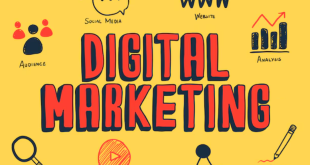In the ever-evolving world of technology, digital marketing remains a cornerstone for business growth and customer engagement. With 2024 bringing new challenges and opportunities, staying ahead in the digital marketing game has never been more critical. This guide explores the most effective strategies for digital marketing this year, ensuring your business thrives in an increasingly competitive landscape.
1. Understanding Digital Marketing in 2024
Digital marketing encompasses a wide range of online efforts aimed at promoting products and services. While the core principles remain constant, 2024 introduces new trends and technologies that reshape the landscape.
To begin, it’s crucial to recognize the centrality of personalization. Customers demand tailored experiences, and businesses that prioritize personalization are more likely to build lasting relationships. Additionally, sustainability and ethical marketing practices are becoming important factors for consumers.
By staying informed about emerging trends, marketers can align their strategies with consumer expectations and technological advancements.
2. Search Engine Optimization: The Backbone of Online Success
Search Engine Optimization (SEO) continues to be a foundational element of digital marketing. With search engines accounting for the majority of online traffic, a well-optimized website is essential for visibility and reach.
In 2024, Google’s algorithm updates prioritize content quality, user experience, and mobile optimization. Businesses should focus on creating high-quality, relevant content that answers users’ queries. Moreover, technical SEO aspects such as site speed, schema markup, and core web vitals are non-negotiable.
Local SEO is another critical area. For businesses with a physical presence, optimizing for local searches and leveraging tools like Google Business Profile can drive substantial traffic and footfall.
3. Social Media Marketing: Connecting with Your Audience
Social Media Marketing (SMM) is more powerful than ever. Platforms like Instagram, TikTok, and LinkedIn are not just for brand awareness but also for lead generation and conversions.
In 2024, short-form video content dominates social media. Videos on platforms like Instagram Reels or TikTok enable businesses to showcase their personality and connect with their audience in authentic ways. Additionally, leveraging user-generated content builds trust and fosters community engagement.
Marketers should also embrace paid social media advertising. With advanced targeting options, these campaigns allow businesses to reach their ideal customers efficiently, driving measurable results.
4. The Rise of AI and Automation in Digital Marketing
Artificial Intelligence (AI) is revolutionizing digital marketing by streamlining processes and enhancing decision-making. In 2024, AI tools are indispensable for businesses aiming to optimize their strategies.
AI-powered chatbots improve customer service by offering instant, 24/7 support. Similarly, AI tools for content creation and data analysis allow marketers to identify trends and create relevant campaigns more effectively. Automation platforms also enable businesses to personalize emails, schedule social media posts, and manage ad campaigns seamlessly.
By leveraging AI, businesses can focus on strategic activities while improving efficiency and customer satisfaction.
5. Content Marketing: Building Authority Through Value
Content Marketing remains a critical strategy for establishing authority and building trust. By providing valuable and informative content, businesses can attract and retain their target audience.
In 2024, the focus is on creating diverse content formats—blogs, videos, podcasts, and infographics—to cater to varying audience preferences. Interactive content such as quizzes and polls is also gaining popularity as it increases engagement.
Consistency is key to content marketing success. Publishing high-quality, regular content not only drives traffic but also improves your site’s SEO rankings, creating a virtuous cycle of growth.
6. Leveraging Data and Analytics for Smarter Decisions
Data-driven marketing is no longer optional; it’s a necessity. In 2024, businesses must harness analytics to refine their campaigns and achieve better results.
With tools like Google Analytics 4 (GA4), marketers can gain deeper insights into user behavior and campaign performance. Tracking key performance indicators (KPIs) such as conversion rates, click-through rates, and engagement metrics helps optimize strategies.
Furthermore, predictive analytics enables businesses to anticipate trends and consumer needs, allowing for proactive decision-making.
7. Email Marketing: The Timeless Strategy
Despite the rise of newer channels, email marketing remains one of the most effective tools for nurturing leads and retaining customers. In 2024, personalization and automation elevate email campaigns to new heights.
Segmenting email lists based on customer behavior and preferences ensures that recipients receive relevant content. Automated workflows—such as welcome emails and abandoned cart reminders—improve efficiency and drive conversions.
Additionally, integrating interactive elements like polls or GIFs into emails enhances engagement and makes campaigns more memorable.
8. The Role of Influencer Marketing
Influencer marketing continues to thrive as a powerful method of building brand credibility. In 2024, partnerships with influencers provide access to highly engaged audiences.
Micro-influencers, in particular, are gaining traction. With smaller but loyal followings, they offer cost-effective ways to promote products and services authentically. Collaborations should align with your brand’s values to maintain authenticity.
Marketers must also track ROI from influencer campaigns by using affiliate links, discount codes, or UTM parameters to measure impact.
9. Adapting to Privacy Changes and Ethical Marketing
As privacy regulations evolve, businesses must adapt their digital marketing strategies to maintain trust and compliance. In 2024, transparency and ethical practices are non-negotiable.
With the phase-out of third-party cookies, businesses should focus on building first-party data through methods like email sign-ups and loyalty programs. Providing clear information about data usage fosters trust and strengthens relationships with customers.
Additionally, ethical marketing practices such as inclusivity and honesty in advertising resonate with today’s socially conscious consumers, enhancing brand reputation.
Conclusion
Digital marketing in 2024 requires a blend of creativity, technology, and data-driven insights. By mastering strategies such as Search Engine Optimization, Social Media Marketing, and AI-driven automation, businesses can thrive in a competitive digital landscape. Staying adaptable and prioritizing customer needs will ensure sustained success in the years to come.
Implement these strategies thoughtfully, and your business will be well-positioned to navigate the dynamic world of digital marketing.
 Daily Blogger News Stay updated with the latest trends and insights. Your reliable source for daily updates and information.
Daily Blogger News Stay updated with the latest trends and insights. Your reliable source for daily updates and information.







